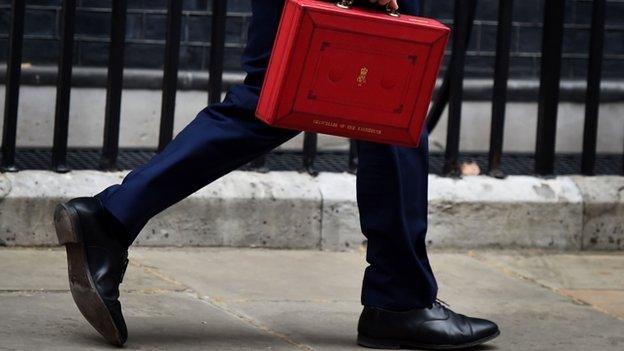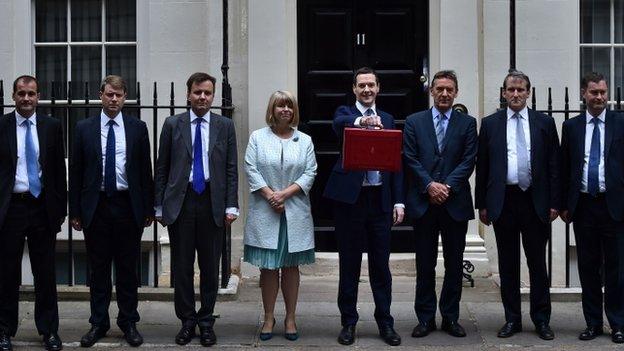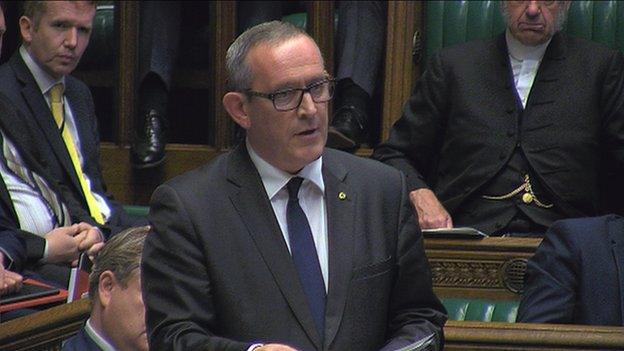Budget 2015: The return of Tina
- Published

Tina, it would appear, is back. Forgotten Tina? The acronym for There Is No Alternative? Regularly cited by Margaret Thatcher? Thatcher? Oh, come on, it hasn't been that long since the Tories were in sole command of the UK.
Sole but not unalloyed because, of course, we now have devolved administrations including the one led by the SNP at Holyrood.
I thought of Tina as I scrutinised George Osborne's delivery of his budget statement. The reminiscence first surfaced as I noted the series of reactions from Mr Osborne's Cabinet colleagues.
The transport secretary looked magisterially content as the Chancellor talked of spending more on roads. The defence secretary looked suitably resolute as the Chancellor promised more money for the military and security services.
Beatific grin
The work and pensions secretary looked positively ecstatic, punching the air like a tennis player who has just served an ace. This in response to the announcement of a National Living Wage, applicable to all aged over 25 and mandatory for employers.
And the prime minister? Supportive throughout, of course, but with a beatific grin upon his features when Mr Osborne talked of the biggest sale of state assets (albeit formerly private banks) since 1987.
Ah, 1987. Even across the airwaves, one could sense the nostalgia palpably washing over the PM. Just a year before Mr Cameron joined the Conservative Research Department. The Thatcher era. The time of Tina.

This was the first "Conservative-only" budget for 18 years
But this is about more than mere nostalgia. George Osborne set out quite deliberately in a range of ways to suggest that there is no effective or realistic alternative to his approach.
He sought to present his proposals as driven by arithmetical logic rather than political choice.
He went further, explicitly adapting policies from rival parties - such as the living wage and curbs on non-dom tax rules. Further still, seeking to place his plan - somewhat ambitiously - within the context of far-reaching reforms such as the Factory Acts and female suffrage.
And yet further, attempting to recruit those self-same rivals to a plan to oblige the UK government, of whatever colour, to maintain a budgetary surplus unless the economy slumps to a defined low rate.
Philosophical edge
All part, to emphasise, of an endeavour by the Chancellor to suggest that Tina is alive and thriving, perhaps seeking non-subsidised accommodation in the yet-to-be-realised Northern Powerhouse.
This pitch, of course, is not primarily aimed at the rival parties - although it purports to be. It is aimed over their heads at the voters. Mr Osborne is seeking to suggest that there is a remorseless logic to his package, that only the ingrate or innumerate would oppose it.
His delivery was an intriguing blend. At times, there was a philosophical edge as he expounded upon the need to make work pay and to reduce the reliance upon welfare as an end in itself.
On other occasions, he seemed more like a stand-up who has been on the circuit for a while and whose soundbites draw instant recognition. "We are all in this together." "Britain is open for business". His fans had heard them before, of course they had, but their very familiarity provoked pleasure.

Stewart Hosie accused the Chancellor of taking from poor and giving to the rich
This aim of suggesting the intrinsic inevitability of his plans is designed to make voters swallow elements they might otherwise find distinctly unpalatable. You don't like welfare cuts, eh? But how about that living wage? Not happy with that cut in corporation tax? How about if I take you out of paying income tax altogether?
Did it work with the opposition parties? Of course not. Indeed, the chamber seemed notably restless with angry interventions from sedentary positions drawing repeated rebukes from the chair.
The SNP's Stewart Hosie dissected the plans in some detail while concluding that the Chancellor was "taking from the poor, giving to the rich", and adding: "The Tories have done it again."
Labour reckoned the budget was a hand up for inherited wealth allied to a slapdown for the poor, most notably through welfare cuts.
The Greens summed up the package as "an attack on the vulnerable".
The Liberal Democrats said the budget proved the "nasty party" was back. For the avoidance of doubt, they meant their former coalition colleagues.
Powers package
There is more to come. Further departmental spending cuts to add to the welfare constraint. Those cuts will feed through to Scotland via the Barnett Formula. Protecting NHS spending, as the Chancellor pledged, should help Scotland, arithmetically. Mr Hosie warned that cuts in educational support in England might also feed through negatively to Scotland.
There was a clear indication of future Tory strategy towards Scotland. Rather than work in progress, Mr Osborne depicted the new powers for Holyrood as a done deal, challenging the SNP: "You've got the powers, when are you going to use them?"
The SNP argue that the powers package is far from settled, that there is more Westminster scrutiny to come - and much more discussion with the Scottish government. Further, they argue that the final scope of the deal depends upon the fiscal framework currently being negotiated between themselves and the Treasury. More on that, much more.
But right now, following this budget, there are calculations to be made. Employers need to work out how they cope with the changes in tax - and, particularly, the move towards a mandatory living wage. Families reliant upon benefits will be anxiously reviewing their household finances.
And then the political calculations. Will more favour the tax cuts and living wage than deplore the cuts in benefit? For the Chancellor, presented with endless sums as he finalises his plan, that is perhaps the most salient calculation of all.